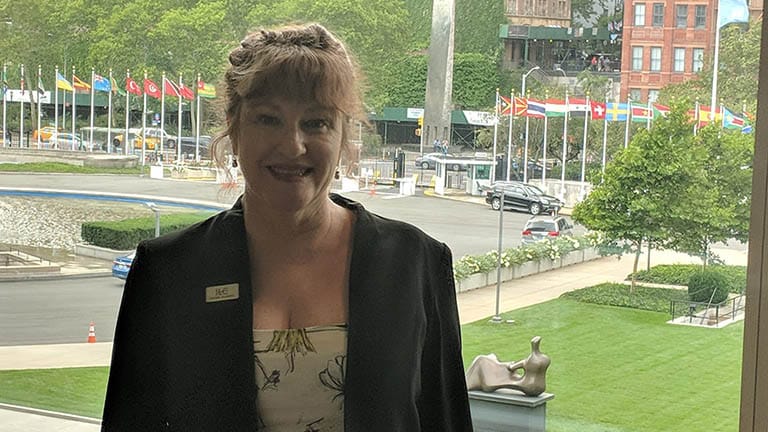
Professor Julie Byles shares insight into the care and rights of an ageing population.
Author: Professor Julie Byles

We all have rights that are protected under United Nations conventions. Do we need extra safeguards to protect these rights for older people? These are the issues that were discussed at the United Nations last month.
Delegates from UN member states, Human Rights Institutions, and Non-Government Organisations discussed rights for long term care, palliative care, and autonomy and independence. As people age they may need greater support with daily activities, and help to remain socially connected. They also should preserve the right to have a say in what happens to them, and the right to be treated with dignity.
We may feel that these rights are a given, but sadly many older people around the world are precluded from participating in work and community activities, have difficulty accessing health and aged care, and suffer financial, physical and emotional abuse. Disease, disability, and ageism can reduce the ability of older people to have their rights upheld and their needs met.
Which begs the question “how old, is old?” The World Health Organization approach to healthy ageing places less importance on birthdays, and more importance on a person’s ability to do the things they choose to do and that give their life meaning. This includes the ability to move around, meet basic needs, have relationships, to learn, to grow, and make decisions. We all hope to be older, and when we are, we will still be ourselves but with more experience.
We have heard from thousands of women in the Australian Longitudinal Study on Women’s Health (known as Women’s Health Australia), about ageing well in their 70s, 80s, and now their 90s. These women have taught me to have a positive outlook on ageing, and to strive to age well. While many women have developed some health conditions or disability, most have remained active, in their own homes, and in their communities. Over time, they receive increasing levels of support from community services. Towards the end of life, some move into residential aged care, particularly women with dementia. Some women tell of their struggle with daily tasks, difficulties managing chronic conditions, pain, loneliness and isolation. Integrating health and aged care services can also be a burden.
Australia affords a very high level of health, with long life expectancies for most, and good access to health and aged care. But we can do better. According the 2015 Global AgeWatch Index, Australia ranks 17th out of 96 countries, behind New Zealand in 12th Place, United Kingdom in 10th place, and USA in 9th place. Sweden is number 1. Most of our high position is due to our good health, but we lose position based on income security and age friendly environments.
Recent reforms to Australia’s aged care system, focus on consumer directed care. The aim is to improve the choices and quality of care for older people, and with a focus on maintaining abilities and quality of life. Ideally, getting help for small needs early will help people maintain their functional abilities, and the best possible well-being. But there are many challenges in keeping up with demands, and in providing timely assessments and services. Caring for older people is also a community responsibility. Mostly aged care is provided by older people looking after older people, and by friends and family.
Over the next 20 years, we will see the large cohort of people born during the post-war baby boom enter their later years. Our data suggest that women in this cohort may have more chronic disease and more disability than the previous generation. Many of these women who have cared for their parents, husbands and others, are now wondering who will provide care for them in their older age.
The UN meeting held last month was the ninth in a series of annual meetings. How old will you be when a convention on older people’s rights is delivered? And what rights do you hope to enjoy as your future self?
Professor Julie Byles is Global Innovation Chair in Responsive Transitions in Health and Ageing at the University of Newcastle. Last month she attended the United Nations Open Ended Working Group on Ageing as part of a delegation from the International Longevity Centres Global Alliance.
HMRI would like to acknowledge the Traditional Custodians of the land on which we work and live, the Awabakal and Worimi peoples, and pay our respects to Elders past and present. We recognise and respect their cultural heritage and beliefs and their continued connection to their land.

Hunter Medical Research Institute
We’re taking healthy further.
Locked Bag 1000
New Lambton
NSW, Australia, 2305



This site is protected by reCAPTCHA and the Google Privacy Policy and Terms of Service apply.
Copyright © 2024 Hunter Medical Research Institute | ABN: 27 081 436 919
Site by Marlin Communications
